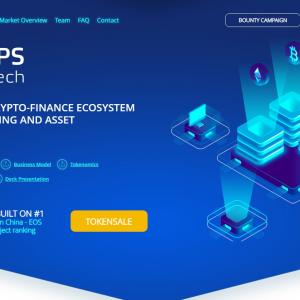STIPS [STIPS]
ENDED: January 01, 2019Transparency Details
We have unverified contact details for this ICO
We have no information about the team
We have unverified information about this ICO
Description
A DECENTRALIZED CRYPTO-FINANCE ECOSYSTEM FOR SMART INVESTING AND ASSET MANAGEMENT
- Team
- Overview
- Timeline
- Financial
- Ratings & Flags
- Share & Embed
ICO Link
Executive Summary
The digital assets market started forming in 2009, with the emergence of Bitcoin (BTC), the firs tever cryptocurrency. Soon, when the first altcoin (Namecoin and Litecoin) appeared in 2011, it became clear that the market was on the threshold of meeting the brand-new class of previously-unknown assets that are to take up a strong position in the finance world. The number of cryptocurrencies, as well as total market capitalization, grew at an exponential rate, which led to emergence of new trading platforms (exchanges) and funds engaged in investing in cryptoassets.
According to coinmarketcap.com, the daily crypto asset traded value reached USD 50 billion in 2018. As reported by Autonomous NEXT, a British fintech analytics company, there were 312 cryptocurrency hedge funds as at Q3 2018. Assessed together, these funds control USD 6-7 billion of cryptoassets (around 2 %). Cryptocurrency and blockchain awareness spreads and grows at an amazingly quick rate: a global study of cryptocurrency involved purchases made by Visa, MasterCard, and UnionPay card users shows that 89 % of respondents are well aware of cryptocurrencies, while 53 % have already bought some for the last 12 months. Such a high level of engagement is ensured by blockchain itself, a technology that cryptoeconomy is based on. Never any scientific institution would dare to argue on the blockchain breakthrough. This innovation is empowered to remake the very structure of user interaction and financial services. In 2016, the World Economic Forum became one of the first who foretold the rapid growth of blockchain — a thing that “boggles imaginations and gobbles the financial services ecosystem.” The core of blockchain is electronic transaction-recording tool which requires no third-party involvement and enables transactors track related data through the network. In simple words, blockchain is a distributed data store for digital transactions that have the multistep confirmation system, and thus it needs no further audit. Moreover, the data are always open for everyone having access to the network.
This system formalizes cryptocurrency payments and prevents any cases of malicious use of the currency units. A chart below illustrates the growth of bitcoin wallets on blockchain.com, one of the world’s most popular portals. For 6 years, their number increased from 0 to 27,000,000, just on the one resource. 300,000 Bitcoin transactions are processed every day, with the total daily turnover of around BTC 1,000,000 (6 % of the market capitalization). Across the TOP-10 cryptocurrencies, the overall daily number of transactions comes to about 1.5 million1.
According to coinmarketcap.com, the daily crypto asset traded value reached USD 50 billion in 2018. As reported by Autonomous NEXT, a British fintech analytics company, there were 312 cryptocurrency hedge funds as at Q3 2018. Assessed together, these funds control USD 6-7 billion of cryptoassets (around 2 %). Cryptocurrency and blockchain awareness spreads and grows at an amazingly quick rate: a global study of cryptocurrency involved purchases made by Visa, MasterCard, and UnionPay card users shows that 89 % of respondents are well aware of cryptocurrencies, while 53 % have already bought some for the last 12 months. Such a high level of engagement is ensured by blockchain itself, a technology that cryptoeconomy is based on. Never any scientific institution would dare to argue on the blockchain breakthrough. This innovation is empowered to remake the very structure of user interaction and financial services. In 2016, the World Economic Forum became one of the first who foretold the rapid growth of blockchain — a thing that “boggles imaginations and gobbles the financial services ecosystem.” The core of blockchain is electronic transaction-recording tool which requires no third-party involvement and enables transactors track related data through the network. In simple words, blockchain is a distributed data store for digital transactions that have the multistep confirmation system, and thus it needs no further audit. Moreover, the data are always open for everyone having access to the network.
This system formalizes cryptocurrency payments and prevents any cases of malicious use of the currency units. A chart below illustrates the growth of bitcoin wallets on blockchain.com, one of the world’s most popular portals. For 6 years, their number increased from 0 to 27,000,000, just on the one resource. 300,000 Bitcoin transactions are processed every day, with the total daily turnover of around BTC 1,000,000 (6 % of the market capitalization). Across the TOP-10 cryptocurrencies, the overall daily number of transactions comes to about 1.5 million1.
Documents
Whitelist and KYC
This ICO has a whitelist and a KYC (Know Your Customer) policy. Need to register first in order to be able to submit the official documentation.
The Team
Timeline
Sale Starts
1st September 2018The ICO/Token/Coin sale opens
Happened: 7 Years, 3 Months, 1 Days ago
Sale Ends
1st January 2019The ICO/Token/Coin sale closes
Happened: 6 Years, 11 Months, 1 Days ago
TODAY
2nd December 2025


